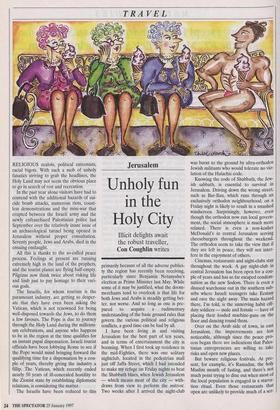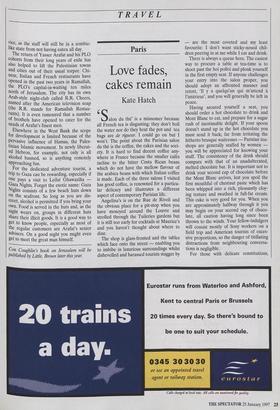TRAVEL
Jerusalem
Unholy fun in the Holy City
Illicit delights await the robust traveller, Con Coughlin writes RELIGIOUS zealots, political extremists, racial bigots. With such a mob of unholy fanatics striving to grab the headlines, the Holy Land may not seem the obvious place to go in search of rest and recreation.
In the past year alone visitors have had to contend with the additional hazards of sui- cide bomb attacks, numerous riots, count- less demonstrations and the mini-war that erupted between the Israeli army and the newly enfranchised Palestinian police last September over the relatively inane issue of an archaeological tunnel being opened in Jerusalem without proper consultation. Seventy people, Jews and Arabs, died in the ensuing onslaught.
All this is thanks to the so-called peace process. Feelings at present are running extremely high in the land of the prophets, and the tourist planes are flying half-empty. Pilgrims now think twice about risking life and limb just to pay homage to their vari- ous gods.
The Israelis, for whom tourism is the paramount industry, are getting so desper- ate that they have even been asking the Vatican, which is not renowned for being well-disposed towards the Jews, to do them a few favours. The Pope is due to journey through the Holy Land during the millenni- um celebrations, and anyone who happens to be in the region at the time qualifies for an instant papal dispensation. Israeli tourist officials have been lobbying Rome to see if the Pope would mind bringing forward the qualifying time for a dispensation by a cou- ple of years, thereby giving the industry a fillip. The Vatican, which recently ended nearly 50 years of ill-concealed hostility to the Zionist state by establishing diplomatic relations, is considering the matter.
The Israelis have been reduced to this primarily because of all the adverse publici- ty the region has recently been receiving, particularly since Benjamin Netanyahu's election as Prime Minister last May. While some of it may be justified, what the doom- merchants tend to overlook is that life for both Jews and Arabs is steadily getting bet- ter, not worse. And so long as one is pre- pared to acquire a rudimentary understanding of the basic ground rules that govern the various political and religious conflicts, a good time can be had by all.
I have been living in and visiting Jerusalem for the best part of ten years, and in terms of entertainment the city is booming. When I first took up residence in the mid-Eighties, there was one solitary nightclub, located in the pedestrian mall just off Jaffa Street, which I had intended to make my refuge on Friday nights to beat the Shabbath blues, when Jewish Jerusalem — which means most of the city — with- draws from view to perform the mitzvot. Two weeks after I arrived the night-club was burnt to the ground by ultra-orthodox Jewish militants who would tolerate no vio- lation of the Halachic code.
Knowing the code of Shabbath, the Jew- ish sabbath, is essential to survival in Jerusalem. Driving down the wrong street, such as Bar-Ilan, which runs through an exclusively orthodox neighbourhood, on a Friday night is likely to result in a smashed windscreen. Surprisingly, however, even though the orthodox now run local govern- ment, the social atmosphere is much more relaxed. There is even a non-kosher McDonald's in central Jerusalem serving cheeseburgers throughout the weekend. The orthodox seem to take the view that if they are left in peace, they will not inter- fere in the enjoyment of others.
Cinemas, restaurants and night-clubs stay throughout the week. A gay night-club in central Jerusalem has been open for a cou- ple of years and has so far escaped condem- nation as the new Sodom. There is even a disused warehouse out in the southern sub- urbs where Israeli teenagers take Ecstasy and rave the night away. The main hazard there, I'm told, is the unnerving habit off- duty soldiers — male and female — have of placing their loaded machine-guns on the floor and dancing round them. Over on the Arab side of town, in east Jerusalem, the improvements are less noticeable, although since the peace pro- cess began there are indications that Pales- tinian entrepreneurs are willing to take risks and open new places.
But beware religious festivals. At pre- sent, for example, it's Ramadan, the holy Muslim month of fasting, and there's not much point trying to dine out when most of the local population is engaged in a starva- tion ritual. Even those restaurants that open are unlikely to provide much of a ser-
TRAVEL
vice, as the staff will still be in a zombie- like state from not having eaten all day. The return of Yasser Arafat and his PLO cohorts from their long years of exile has also helped to lift the Palestinian towns and cities out of their usual torpor. Chi- nese, Italian and French restaurants have opened in the past two years in Ramallah, the PLO's capital-in-waiting ten miles north of Jerusalem. The city has its own Arab-style night-club called R.R. Cheers, named after the American television soap (the R.R. stands for Ramallah Restau- rants). It is even rumoured that a number of brothels have opened to cater for the needs of Arafat's finest men.
Elsewhere in the West Bank the scope for development is limited because of the pervasive influence of Hamas, the Pales- tinian Islamic movement. In newly liberat- ed Hebron, for example, not only is all alcohol banned, so is anything remotely approaching fun. For the dedicated adventure tourist, a trip to Gaza can be rewarding, especially if one pays a visit to Leilat Ghawaziha Gaza Nights. Forget the exotic name: Gaza Nights consists of a few beach huts down on the seafront. So long as you are dis- creet, alcohol is permitted if you bring your own. Food is served in the huts and, as the night wears on, groups in different huts share their illicit goods. It is a good way to get to know people, especially as most of the regular customers are Arafat's senior advisers. On a good night you might even get to meet the great man himself.
Con Coughlin's book on Jerusalem will be published by Little, Brown later this year.



































































 Previous page
Previous page